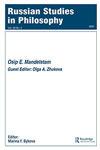今天我们读陀思妥耶夫斯基时的思考方式
IF 0.1
4区 哲学
Q4 Arts and Humanities
引用次数: 0
摘要
摘要陀思妥耶夫斯基对俄欧关系主题以及俄罗斯社会本质的分析,充满了“人”、“民族原则”、“灵魂”、“精神”等概念隐喻。这些概念和术语是作者自己提出的,基于这一术语的研究方法已经在俄罗斯公众意识中存在了近一个半世纪。这造成了一种错觉,即这些术语可以用来理解俄罗斯和欧洲之间的基本差异,特别是它们根本不同的财产关系和权利。作者对差异问题的回答如下:俄罗斯的伟大在于它拒绝欧洲的黑暗,而它的麻烦源于不一致,源于这种拒绝的不够坚定。本文认为,辩论家陀思妥耶夫斯基使用这些术语的长期“解释力”是由俄罗斯客观存在的经济和政治关系发展不足所决定的。因此,《作家日记》仍然引起了读者的共鸣,他们容易上当受骗,但远离“强大的文化”(V.Kelle),不愿意反思,他们从未放弃俄罗斯“特殊道路”的梦想,这条道路将使俄罗斯“一举”摆脱现代世界的困难。但这些梦想从未实现,与传统主义的呼声相反,俄罗斯顽固地试图走上与人类其他国家相同的道路。这个过程持续的时间越长,政治辩论家陀思妥耶夫斯基的概念隐喻的解释力就越弱。本文章由计算机程序翻译,如有差异,请以英文原文为准。
The Way We Think When Reading Dostoevsky Today
ABSTRACT Fyodor M. Dostoevsky’s analysis of the theme of Russia–Europe relations, as well as the nature of Russian society, is replete with concept-metaphors like “people,” “national principle,” “soul,” “spirit,” and so forth. These concepts and terms are proposed by the writer himself, and the method of research that is based on this terminology has been present in Russian public consciousness for almost a century and a half now. This creates the illusion that these terms can be used to understand the basic differences between Russia and Europe, particularly their fundamentally different property relations and rights. The writer’s answer to the question of difference is as follows: Russia’s greatness consists in its rejection of European darkness, and its troubles derive from an inconsistency, from the insufficient firmness of that rejection. This article argues that the reason for the long-term “explanatory power” of these terms used by the polemicist Dostoevsky has been determined by the insufficient development of those economic and political relations that objectively exist in Russia. Thus, the Diary of a Writer still resonates with the reader who is gullible but distant from “strong culture” (V. Kelle) and uninclined to reflection, the reader who never abandons the dreams of Russia’s “special path” that would allow it, “in one fell swoop,” to escape the difficulties of the modern world. But these dreams never come true, and, contrary to the calls for traditionalism, Russia stubbornly tries to follow the same path as the rest of humanity. The longer this process goes on, the more the explanatory power of political polemicist Dostoevsky’s concept-metaphors wanes.
求助全文
通过发布文献求助,成功后即可免费获取论文全文。
去求助
来源期刊

RUSSIAN STUDIES IN PHILOSOPHY
PHILOSOPHY-
CiteScore
0.10
自引率
0.00%
发文量
14
期刊介绍:
Russian Studies in Philosophy publishes thematic issues featuring selected scholarly papers from conferences and joint research projects as well as from the leading Russian-language journals in philosophy. Thematic coverage ranges over significant theoretical topics as well as topics in the history of philosophy, both European and Russian, including issues focused on institutions, schools, and figures such as Bakhtin, Fedorov, Leontev, Losev, Rozanov, Solovev, and Zinovev.
 求助内容:
求助内容: 应助结果提醒方式:
应助结果提醒方式:


